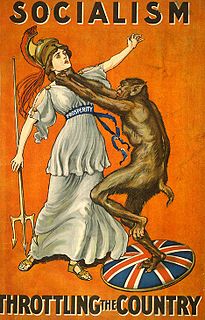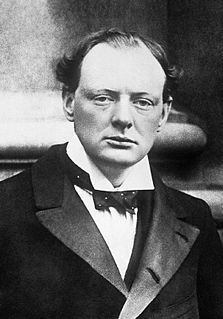
The Liberal Party was one of the two major political parties in the United Kingdom with the opposing Conservative Party in the 19th and early 20th centuries. The party arose from an alliance of Whigs and free trade-supporting Peelites and the reformist Radicals in the 1850s. By the end of the 19th century, it had formed four governments under William Gladstone. Despite being divided over the issue of Irish Home Rule, the party returned to government in 1905 and then won a landslide victory in the following year's general election.

Arthur Neville Chamberlain was a British politician of the Conservative Party who served as Prime Minister of the United Kingdom from May 1937 to May 1940. He is best known for his foreign policy of appeasement, and in particular for his signing of the Munich Agreement on 30 September 1938, conceding the German-speaking Sudetenland region of Czechoslovakia to Germany. Following the German invasion of Poland on 1 September 1939, which marked the beginning of World War II, Chamberlain announced the declaration of war on Germany two days later and led the United Kingdom through the first eight months of the war until his resignation as prime minister on 10 May 1940.

David Lloyd George, 1st Earl Lloyd-George of Dwyfor, was a Welsh statesman and Liberal politician who served as Prime Minister of the United Kingdom from 1916 to 1922. He was the final Liberal to hold the post of prime minister, but his support increasingly came from the Conservatives who finally dropped him.

Herbert Henry Asquith, 1st Earl of Oxford and Asquith,, generally known as H. H. Asquith, was a British statesman and Liberal politician who served as Prime Minister of the United Kingdom from 1908 to 1916. He was the last prime minister to command a majority Liberal government, and he played a major role in the design and passage of major liberal legislation and a reduction of the power of the House of Lords. In August 1914, Asquith took Great Britain and the British Empire into the First World War. During 1915, his government was vigorously attacked for a shortage of munitions and the failure of the Gallipoli Campaign. He formed a coalition government with other parties, but failed to satisfy critics. As a result, he was forced to resign in December 1916, and never regained power.

Andrew Bonar Law was a British Conservative politician who served as Prime Minister of the United Kingdom from October 1922 to May 1923.

Richard Burdon Haldane, 1st Viscount Haldane, was an influential British Liberal and later Labour politician, lawyer and philosopher. He was Secretary of State for War between 1905 and 1912 during which time the "Haldane Reforms" of the British Army were implemented. Raised to the peerage as Viscount Haldane in 1911, he was Lord Chancellor between 1912 and 1915, when he was forced to resign because of false allegations of German sympathies. He later joined the Labour Party and once again served as Lord Chancellor in 1924 in the first Labour administration. Apart from his legal and political careers, Haldane was also an influential writer on philosophy, in recognition of which he was elected a Fellow of the British Academy in 1914.

Archibald Henry Macdonald Sinclair, 1st Viscount Thurso,, known as Sir Archibald Sinclair, Bt, between 1912 and 1952, and often as Archie Sinclair, was a British politician and leader of the Liberal Party.

Robert Offley Ashburton Crewe-Milnes, 1st Marquess of Crewe,, known as The Lord Houghton from 1885 to 1895 and as The Earl of Crewe from 1895 to 1911, was a British Liberal politician, statesman and writer.
A war cabinet is a committee formed by a government in a time of war. It is usually a subset of the full executive cabinet of ministers. It is also quite common for a war cabinet to have senior military officers and opposition politicians as members.

Reginald McKenna was a British banker and Liberal politician. His first Cabinet post under Henry Campbell-Bannerman was as President of the Board of Education, after which he served as First Lord of the Admiralty. His most important roles were as Home Secretary and Chancellor of the Exchequer during the premiership of H. H. Asquith. He was studious and meticulous, noted for his attention to detail, but also for being bureaucratic and partisan.

The 1909/1910 People's Budget was a proposal of the Liberal government that introduced unprecedented taxes on the lands and incomes of Britain's wealthy to fund new social welfare programmes. It passed the House of Commons in 1909 but was blocked by the House of Lords for a year and became law in April 1910.

The National Liberal Club (NLC) is a London private members' club, open to both men and women. It was established by William Ewart Gladstone in 1882 to provide club facilities for Liberal Party campaigners among the newly enlarged electorate following the Third Reform Act in 1884, and was envisioned as a more accessible version of a traditional London club.

Black Friday was a suffragette demonstration in London on 18 November 1910, in which 300 women marched to the Houses of Parliament as part of their campaign to secure voting rights for women. The day earned its name from the violence meted out to protesters, some of it sexual, by the Metropolitan Police and male bystanders.

The Budget Protest League was a British pressure group formed in June 1909 and led by Walter Long to oppose David Lloyd George's "People's Budget" outside of Parliament.

The Liberal government of the United Kingdom of Great Britain and Ireland that began in 1905 and ended in 1915 consisted of two ministries: the first led by Henry Campbell-Bannerman and the final three by H. H. Asquith.

This article documents the career of Winston Churchill in Parliament from its beginning in 1900 to the start of his term as Prime Minister of the United Kingdom in World War II.
The National Liberal Party was a liberal political party in the United Kingdom from 1922–23. It was created as a formal party organisation for those Liberals, led by Prime Minister David Lloyd George, who supported the Coalition Government (1918–22) and subsequently a revival of the Coalition, after it ceased holding office. It was officially a breakaway from the Liberal Party. The National Liberals ceased to exist in 1923 when Lloyd George agreed to a merger with the Liberal Party.

Sir Andrew William Barton was a British Liberal politician and businessman.
There was a by-election in the dual member constituency of Dundee in 1908.

Winston Churchill was first elected to the UK Parliament at the 1900 general election as one of two Conservative Party members representing the Oldham constituency. He took his seat in the House of Commons in February 1901 but soon became critical of the Conservative government on a number of issues. On 31 May 1904, he formally crossed the floor of the Commons to join the opposition Liberals, remaining a party member until March 1924.


















